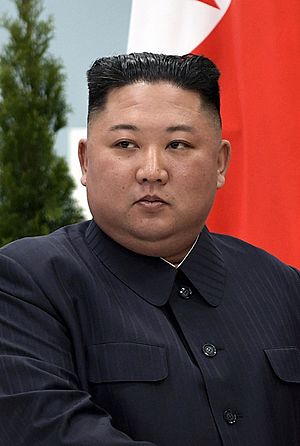Supreme Leader (North Korean title) facts for kids
Quick facts for kids Supreme Leader of theDemocratic People's Republic of Korea |
|
|---|---|
| Term length | Life tenure |
| Formation | 9 September 1948 |
| First holder | Kim Il Sung |
| Supreme Leader of the Democratic People's Republic of Korea | |
|---|---|
| Korean name | |
| Hangul | 조선민주주의인민공화국최고령도자 |
The title of Supreme Leader (Korean: 최고령도자; MR: Ch'oego Ryŏngdoja) is used for the top leader of North Korea. This person is the most important leader of the Workers' Party of Korea, which is the main political party, and also the leader of the country and its army.
For a long time, North Korea's leaders were not called "Supreme Leader" while they were alive. They had other special names. For example, Kim Il Sung was known as "Great Leader," and his son, Kim Jong Il, was called "Dear Leader." The title "Supreme Leader" was usually used for them only after they had passed away.
Contents
Understanding the Supreme Leader Title
The name "Supreme Leader" was first used for Kim Il Sung after he died. During his life, he was known as "Great Leader" (위대한 수령). This special title is still only used for him.
His son, Kim Jong Il, was called "Dear Leader" (친애하는 령도자) while he was alive. After his death, North Korean news began to call him "Supreme Leader," just like his father.
Kim Jong Un, the grandson, was the first to be called "Supreme Leader" often while he was still alive. This started around October 2020, when he was about 37 years old. This was part of the plans to make him the General Secretary of the Workers' Party of Korea. This is the most powerful position in the country's only political party.
North Korea's Top Leaders
North Korea has had three main leaders, all from the same family. Each one has held important roles in the government and the Workers' Party of Korea.
| No | Portrait | Name (Born–Died) |
Main Title(s) | Time in Office | Tenure (Years as Leader) |
|---|---|---|---|---|---|
| 1 |  |
Kim Il Sung 김일성 (1912–1994) |
Premier of the Cabinet | 9 September 1948 – 28 December 1972 | 9 September 1948 — 8 July 1994 (45 years, 302 days) |
| Chairman of the WPK | 24 June 1949 – 12 October 1966 | ||||
| General Secretary of the WPK | 12 October 1966 – 8 July 1994 | ||||
| President of North Korea | 28 December 1972 – 8 July 1994 | ||||
| 2 |  |
Kim Jong Il 김정일 (1941–2011) |
Chairman of the National Defence Commission | 9 April 1993 – 17 December 2011 | 8 July 1994 — 17 December 2011 (17 years, 162 days) |
| General Secretary of the WPK | 8 October 1997 – 17 December 2011 | ||||
| 3 |  |
Kim Jong Un 김정은 (born 1982 or 1983) |
First Secretary of the WPK | 11 April 2012 – 9 May 2016 | 17 December 2011 — present (14 years, 13 days) |
| First Chairman of the National Defence Commission | 11 April 2012 – 29 June 2016 | ||||
| Chairman of the WPK | 9 May 2016 – 10 January 2021 | ||||
| President of the State Affairs Commission | 29 June 2016 – present | ||||
| General Secretary of the WPK | 10 January 2021 – present |
- The titles in bold are the most important positions within the Workers' Party of Korea. This is the only political party in North Korea.
Timeline of North Korean Leaders
This timeline shows when each of the three Supreme Leaders held their main positions.

Related Topics
- Eternal leaders of North Korea
- Kim family
- Government of North Korea
- North Korean cult of personality
- Residences of North Korean leaders
- Paramount leader, a similar title used in China


